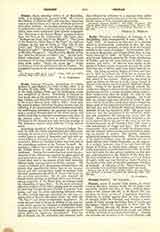

Crolly, WILLIAM, Archbishop of Armagh, b. at Ballykilbeg, near Downpatrick, June 8, 1780; d. April 6, 1849. At fourteen he was sent to a classical school in Downpatrick, conducted by Rev. Mr. Nelson, a Unitarian minister, as there were no Catholic schools in the north of Ireland. In November, 1801, he went to Maynooth, and obtained first place in dogmatic theology in 1806. At Pentecost of the same year he was ordained priest by Dr. Troy, Archbishop of Dublin, and for six years lectured in logic, meta-physics, and ethics. In 1812 he took charge of the parish of Belfast, which comprised not only the entire town but also a district more than thirty miles in extent. On being appointed Bishop of Down and Connor in 1825, he induced the Holy See to change the episcopal parish from Downpatrick to Belfast, the real center of the diocese. During the ten years he spent as bishop of this see he built a large church in almost every parish, and founded St. Malachy’s Semi-nary. Owing to the dearth of Catholic schools, Dr. Crolly was obliged to allow Catholic children to attend Protestant schools, a course of action which caused a fierce controversy after his death. In 1835 he was appointed to the archdiocese of Armagh. Up to his time no primate had been allowed to reside in that town, but he lived alternately there and in Drogheda, where most of the primates had dwelt in penal times. His first care was to found St. Patrick’s Seminary in Armagh, which was opened in 1838. His great work however, was the foundation of the cathedral, which was not completed till twenty-four years after his death. Having with great difficulty acquired a site on an historic hill by the side of the town, he laid the foundation stone on St. Patrick’s Day, 1840, amid a vast assemblage of clergy and laity. The work of construction went steadily on until the famine years, and the primate visited several cities in Ireland, making an appeal in person. The famine, however, stopped the progress of the work. When the question of the Queen’s colleges arose, the primate was one of those bishops who looked favorably on the project. It is certain, however, that if he had lived till the Synod of Thurles, in which these colleges were formally condemned as pernicious to the Faith, he would have laid aside his own private opinions on this subject, and submitted to the decision of the Holy See. He died in Drogheda of the cholera, on Good Friday (April 6), 1849, and was buried on Easter Sunday in the center of the choir of the still unfinished cathedral of Armagh. A collection of the “Select Sermons” of the primate was published shortly after his death.
A. COLEMAN.

